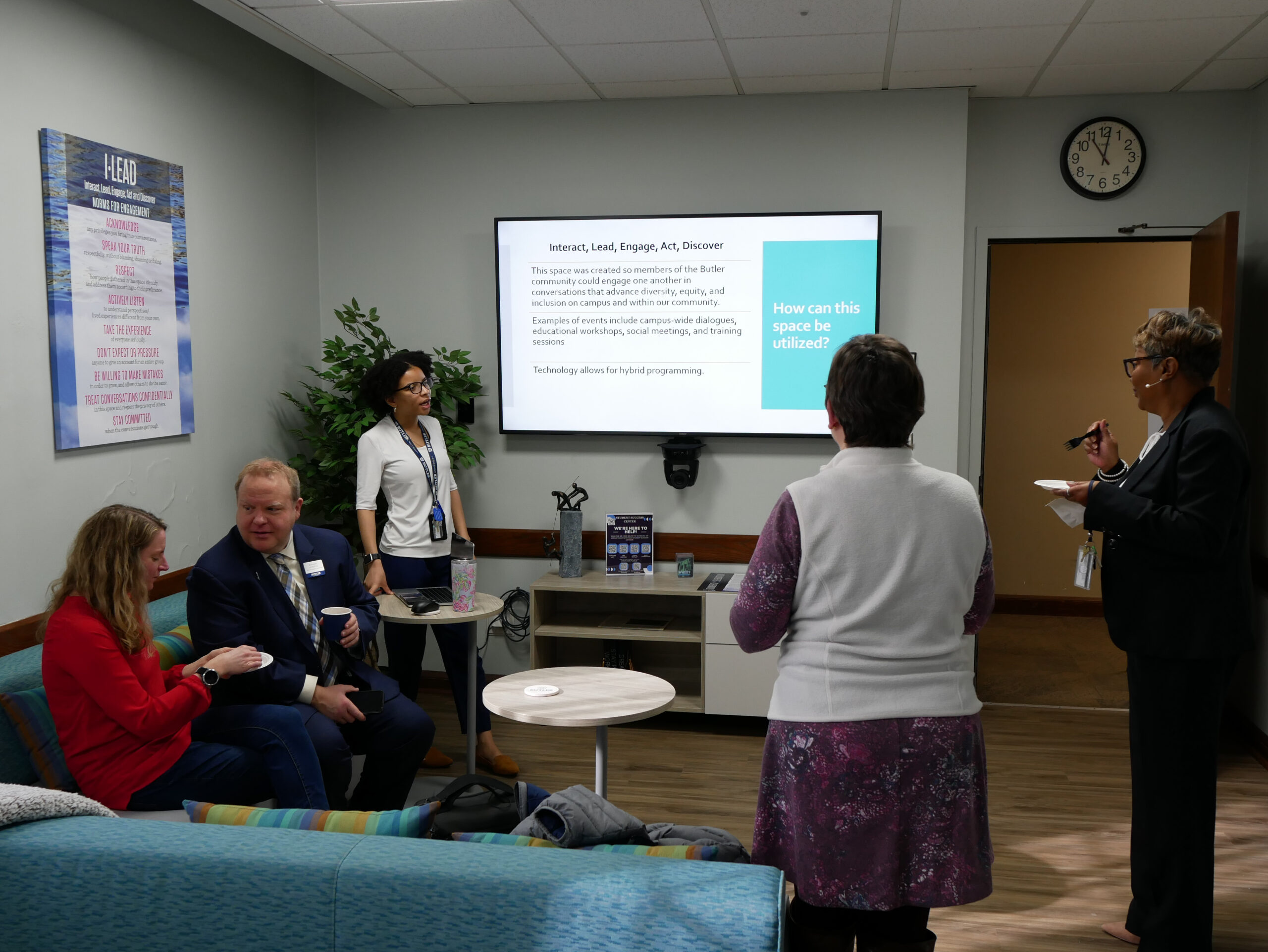The Division of Diversity, Equity and Inclusion hosted a cozy open house on Feb. 7 to kick off the new space. Photo by Jonathan Wang.
LOVE LEE | STAFF REPORTER | llee1@butler.edu
The I-LEAD Space has officially launched in Jordan Hall room 186. Dr. Su-Mei Ooi, director of academic affairs for Diversity, Equity and Inclusion (DEI) and associate professor of political science, developed the idea for the I-LEAD space in the spring of 2022 and was able to bring it to life with help from the Office of the Provost, among others. She said the space is an extension of the division, and serves the mission of promoting greater diversity through the exchanging of ideas among the faculty, staff and students here on Butler’s campus.
“The I-LEAD space is based on the concept of interactional diversity,” Ooi said. “Unlike representational or compositional diversity, interactional diversity stresses the importance of creating opportunities and spaces for inter-group interaction to bring us to a place of mutual understanding.”
Before being transformed into the I-LEAD space, the space was used as a conference room.
Now, the space is fully furnished with two couches sporting built-in outlets, a TV on one wall, a whiteboard on the other and a long table with chairs towards the back. It is titled after the acronym Interact, Lead, Engage, Act and Discover; this is also displayed on a multi-colored canvas in the room, which also includes expectations for using the space.
“The [new] physical space is just [the Division’s] first [step] of a 3-pronged strategy,” Ooi said. “[The next step in the plan is to] build content programming for meaningful dialogues. Plans are already underway to encourage everyone to come have these conversations and build a culture of open communication.”
The Division of DEI has been educating faculty and staff through intergroup dialogue training since last semester and plans to have mini-sessions for students to learn these skills. The training aims to show participants how they can distinguish between debate, discussion and dialogue through building active listening skills and identifying conversational triggers; the goal is to create a safe space for meaningful conversation.
One of the motives behind the division’s goal of fostering greater interactional diversity on campus is due to the fact Indianapolis, along with many other cities across the country, still suffers from racial residential segregation.
“Schools then reflect the same pattern [of segregation] and this means that people of different racial identities and class backgrounds don’t interact very much,” Ooi said. “This pattern is seen all over the U.S., which is actually becoming more diverse and increasingly segregated, both at the same time.”
Junior psychology major Kathryn Weil has noticed patterns in her interactions with other students since starting at the university as a first-year.
“I would say Butler has a really diverse population in terms of queer students, non-binary students, gender diversity, gender identity,” Weil said. “I don’t feel like there’s a lot of financial diversity, and I don’t think there’s a lot of racial diversity.”
Ooi, among others, took notice of the imbalance and acted upon it as a basis for the creation of the I-LEAD space. She reasons that through this lack of interaction at school, some students may not be fully aware of the lived experiences, or lived injustices, that other students face due to the differing intersections of individuals’ identities.
“Social justice is not an abstract concept, and we need to have conversations based on the lived experiences of those who experience injustice in order to understand how we do better as individuals and as a collective,” Ooi said.
One challenge that Coordinator of DEI Programming Lauryn Jones foresees because of this imbalance is that students may not be able to immediately understand how topics surrounding DEI are relevant to their lives on campus as students, and how these issues are going to transfer into their professional lives.
“The burden is not just on the students but on faculty and staff as well to help students see that [these issues are relevant] because I think that we all play a part in [creating change] together,” Jones said.
Faculty, staff and students can book the room using the EMS system so long as their intention coincides with the mission and values of the I-LEAD space.
Hanako Gavia, assistant director of Butler’s Center for Citizenship and Community, has already begun using the space to meet with community partners, as well as with her Advocates for Community Engagement (ACEs).
“Our community partners really like being able to sit on the couch and have that conversation,” Gavia said. “I have a feeling of it being a lot more welcoming than just like a stuffy office or the power dynamic of me sitting at the desk, and then our ACEs love it too.”
The Division of DEI hopes that students who may not be attuned to issues of social justice can learn by participating in activities located at the I-LEAD space, and learn from both the occasional guest speaker and fellow peers through formal and informal dialogue.
In honor of Black History Month, the Division of DEI is hosting a dialogue in the I-LEAD space on Feb. 22. The discussion will be based on content previously discussed at the event “Happy 5th Birthday: Hair Discrimination Has No Limits” in partnership with Indiana Humanities on Feb. 21 at 7 p.m. in the Johnson Board Room located in Robertson Hall. More information on this and upcoming events can be viewed on Butler DEI’s website, as well as the Butler events calendar.



